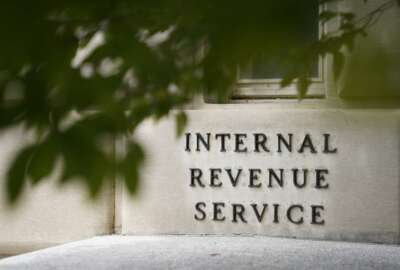
Soon we’ll know how long the Continuing Resolution will be
A government shutdown in three weeks is unlikely, but Congress still has to work out details of a continuing resolution. Then there's the matter of that $47 bil...
Best listening experience is on Chrome, Firefox or Safari. Subscribe to Federal Drive’s daily audio interviews on Apple Podcasts or PodcastOne.
A government shutdown in three weeks is unlikely, but Congress still has to work out details of a continuing resolution. Then there’s the matter of that $47 billion in immediate spending, the White House has requested for COVID relief and a few other things. The Federal Drive with Tom Temin gets the latest from WTOP Capitol Hill correspondent, Mitchell Miller.
Interview transcript:
Tom Temin: Mitchell there is a little bit of sense of deja vu all over again, or insanity depending on your definition of what happens every year. But the continuing resolution itself still has to be resolved to some degree. Right?
Mitchell Miller: Right. There are no illusions of wrapping up a dozen appropriations bills in the coming weeks before the start of the new fiscal year on October 1. So everyone here Republicans, Democrats all saying a continuing resolution has to be done. But it could get complicated by a host of issues that White House requests for $47 billion that you alluded to includes more than half of it going to COVID and monkeypox also includes aid for Ukraine, disaster relief from natural disasters. All of that money being tacked into that short term spending bill is just not going to fly with Republicans. Ukraine aid does seem to be the most likely to survive along with natural disaster aid. But also complicating matters, legislation to codify same sex marriage, which Democrats want to do in the wake of a Supreme Court decision, rather an opinion suggesting it could be at risk of being overturned. Senate Majority Leader Chuck Schumer wants a standalone vote on that, but Democrats are having trouble getting enough Republicans on board to overcome a filibuster. And that could lead to reconsideration of whether to make it part of the CR which Democrats really don’t want to do.
Tom Temin: Yeah, that’s really kind of sort of omnibus with some strange passengers aboard. I guess you could say it’s progress. If they’re only asking for 10s of billions for COVID and monkey pox a couple years ago, it was a trillion at a time. Anyway, does that mean then that could that debate over all those little elements that would go into the CR, could that push us to a shutdown situation?
Mitchell Miller: At the moment, the lawmakers are saying it wouldn’t but you know, as well as I do that in the past, they’ve said everything was copacetic. And then things as they got closer to the deadline, got into a little trouble area. And there’s another troubled area that I hadn’t mentioned yet. And that is in connection with West Virginia Senator Joe Manchin. There was a side deal in connection with the majority leader Schumer in connection with various energy projects and a natural gas pipeline being fast-tracked, which is what Manchin wanted. So they made this deal, and that helped them get the health and climate bill passed before the summer break. But now there’s some murmurs from Democrats that they don’t really like the fact that Schumer is talking about tacking it into this continuing resolution. Schumer last week said that it basically is part of going to be part of the CR. But then right after that Vermont Senator Bernie Sanders popped up on the Senate floor and says he’ll vote against the stopgap measure if it includes the provision. And then later, about 50 House Democrats said that they would oppose this deal with Manchin although they have not said they will actually vote against the bill. Still, it’s another complicating factor. So even though there are assurances from Senate leaders that they will get all of this sorted out, there still always remains the possibility that they will not.
Tom Temin: Sounds like Bernie Sanders and some of the House Democrats liked everything about the infrastructure bill, but the infrastructure. And that permitting is strictly on energy projects like gas pipelines, and what about roads and bridges and other things that often take a long time to get permitted as well?
Mitchell Miller: Right. I mean, this has been an area where Manchin has been trying to get things moved more quickly. It does predominantly deal with energy-type projects. He’s had a pet project, particularly with a pipeline involving West Virginia that he really wanted to get through. And of course, as you know, he has been at times the most powerful person in the Senate because of his unique position in the 50-50 split. So we’ll see how that works out. What they do want to do is get this CR through basically mid-December, then there are hopes, maybe illusions that an overall bill could be worked out in the lame duck session. We’ll have to see about that. By the way, Vermont Senator Patrick Leahy and Alabama Senator Richard Shelby, both key appropriators they are both getting ready to retire. So we’ll have to see if that gives them a little bit more of an impetus to push this across the finish line at some point.
Tom Temin: A lame duck or a Christmas goose, I guess. We’re speaking with Mitchell Miller, Capitol Hill correspondent for WTOP. And there’s also postal service reform pricing going on on Capitol Hill. Some work there from Representative Jerry Connolly.
Mitchell Miller: That’s right. The House oversight and reform subcommittee that’s led by Virginia Congressman Connolly. They held a hearing last week a field hearing in Philadelphia and lawmakers just took turns blasting the Postal Service for poor service. Lawmakers are upset about a wide range of issues including delays and delivery of mail-in ballots from the last presidential election. Pennsylvania Democrats made it clear they want to make sure those ballots are delivered in a timely fashion for the midterm elections. The poster boy for criticism remains Postmaster General Louis DeJoy, who’s trying to implement a variety of reforms. There were also complaints actually about crime against postal carriers, the lawmakers pointing out that the police force for the Postal Service has actually been reduced quite a bit. And Jerry Connolly pointed out there have been more attacks and robberies of people delivering the mail. So that was another complaint and then getting two possible reforms. Connolly has just proposed new legislation that potentially would make it harder for the Postal Service to raise rates. This would require the Postal Regulatory Commission to reexamine its rate setting system, which was only put in place two years ago. The latest system allows the commission to set prices on a formula that takes into account inflation as well as the declines in mail delivery and other factors. DeJoy has been raising rates at a quicker pace than in the past that troubles some lawmakers. Usually it’s based just on inflation. The Postal Service actually announced a profit in the third quarter of 2022. This year, but most of that came from Congress lifting that postal service obligation to prefund retiree benefits for health benefits. Again, Jerry Connolly skeptical of the higher rate hikes, lower services and fewer workers. So he is proposing basically a review period which would sort of slow down the possible rate hikes by the Postal Service.
Tom Temin: There’s an old saying in computers, the engineers say you want better, faster, cheaper, pick two of the above. I guess maybe that’s true of the Postal Service. And finally, because of the short period left in the legislative cycle for this year, is January 6 still occupying or will occupy Congress? Are they going to take up more time for that because of perhaps the perceived political benefit of it?
Mitchell Miller: So obviously, the January 6 hearings took up a lot of oxygen here on Capitol Hill over the summer, there are plans for perhaps at least one more hearing this month. They have not scheduled it yet, but committee members say they keep taking in more information, which has made it more difficult to wrap up everything. And they need to put together a report and they’re racing against those midterm elections, as you pointed out, which could lead to Republicans retaking the house and getting rid of the committee, that’s widely expected. The committee was expected to release a preliminary report or their findings potentially in the next month or so. But they also want to come up with recommendations to make sure that nothing like the insurrection happens again, so a lot of work to do in a short amount of time.
Tom Temin: Mitchell Miller is Capitol Hill correspondent for WTOP.
Copyright © 2024 Federal News Network. All rights reserved. This website is not intended for users located within the European Economic Area.
Tom Temin is host of the Federal Drive and has been providing insight on federal technology and management issues for more than 30 years.
Follow @tteminWFED





